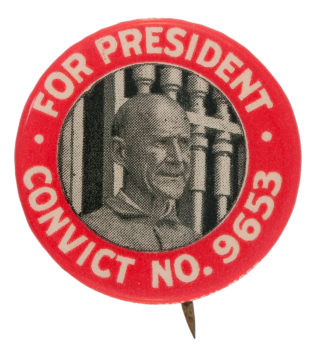
Every American needs to see the new documentary American Socialist: The Life and Times of Eugene Victor Debs. It screens at the Laemmle Monica (Santa Monica) and Playhouse (Pasadena) theatres in the Los Angeles area May 4-10, and may be playing elsewhere by then too. Check your local listings.
In fact, I wish people outside this country could see it too. For one thing, it might inspire them to pursue a socialist road at home. But at least they would see that there have always been decent Americans—millions of us—attempting to wrest our country back from the one percent, and we’re still trying.
This film could be an important part of our struggle. Let every organization seriously committed to deep social change in the U.S. schedule movie nights for American Socialist, ask for a local theatre to book it for a run, or wait for the video, show it in homes, union halls and meeting places, and discuss it. It’s a must-see before November 2018!

And speaking of elections, the film begins with this fun fact: “In the entire history of the United States of America there has been only one presidential candidate imprisoned for his campaign platform—Eugene Victor Debs.”
Now before I proceed any further, time out for some full disclosure. I know the filmmakers Yale Strom and Elizabeth Schwartz and have worked with them, most notably on our Soviet Yiddish songs CD City of the Future. When I heard they were making a Debs film I shot them a little contribution, so my name appears in the final credits. I own my biases.
Debs slowly became a socialist; it didn’t happen overnight. Along the way, as his thinking evolved, he had his agreements and his quarrels with labor unions, syndicalists, fellow socialists of differing tendencies, communists, and the U.S. government. Through it all he retained a rare kind of saintliness, always showing the profoundest empathy with working people—and an implacable hatred for exploiters and warmongers.
In the span of an hour and a half viewers will meet many players in Debs’s story—presidents, labor leaders, writers, politicians, ordinary folks who wrote him heartfelt letters from the hinterland, as well as current-day commentators such as Richard Schneirov, Richard Wolff, Nick Salvatore, Frances Fox Piven, Rick Hertzberg, Jim Bissett and others. As director, Strom includes clips from modern struggles for $15 an hour, for Bernie Sanders’s presidential campaign, and from Pope Francis to show how socialist ideas and ideals have in no way evaporated in the neoliberal Juggernaut against which we are told day in and day out by a supine press that there is no alternative.
Among the most salient of the influences over Debs (born in 1855) were his parents, who named him after two of their favorite socially conscious writers, the today little-known Eugene Sue and the ever-popular Victor Hugo. Little Gene’s best-loved bedtime story was the latter’s affecting Les Misérables.
In over a dozen mini-“chapters” of the film, scriptwriters Yale Strom and Elizabeth Schwartz unspool the major events and developments in Debs’s career, such as the 1877 railway strike, his marriage in 1885, the formation of the American Railway Union, the Pullman Strike in 1894, Debs’s first imprisonment on charges of defying federal injunctions in that strike, his socialist evolution, the founding of the Socialist Party as well as the IWW, and his successive candidacies for president from 1900 up until his last run as prisoner no. 9653 in 1920 from the Atlanta state penitentiary.
The administration of Woodrow Wilson got Debs convicted under the new espionage and sedition acts for his 1916 presidential campaign agitation against American workers participating in the coming world war. Long after the conflict ended Wilson would still not release Debs from prison, continuing to call him “a traitor to this country.” It was left to his successor, Warren G. Harding, to commute his sentence in 1921.
In each of these episodes, the script includes background on what was happening economically and socially in the U.S., prominent figures who played roles in Debs’s life, actual recordings or quotes from contemporaries read by voiceover actors, lots of graphics featuring newspaper accounts, cartoons, photos, as much footage of Debs as they could find, and footage of others as well, including Vladimir Lenin.
Visually, American Socialist is a feast of radical and working-class historical imagery. Throughout there is a plethora of musical documentation as well with either contemporary recordings or modern renditions of many popular songs. An anti-war poem by Carl Sandburg called “Buttons” is graphically illustrated. Amy Madigan narrates.
The film returns many times to Terre Haute, Ind., Debs’s hometown, and to the house he and his wife outfitted—too tastefully and expensively for his own inclinations, but which served as a landing place for the peripatetic and sometimes sickly agitator in between campaigns and prison sentences.

The main point the film drives home is that Debs spoke of socialism in American terms, using our own history and traditions as the basis on which to build a more cooperative future, and avoiding vocabulary of the alien-sounding international socialist polemical jargon. He swam in the mainstream of our culture, going so far as to describe American socialism as “Christianity in action.” Socialist encampments in places like Texas and Oklahoma attracted upwards of 20,000 attendees and modeled themselves on evangelical church revival meetings.
The memorial for Eugene Victor Debs was held at Madison Square Garden in 1926. He has come down to us as one of the most charismatic, magnetic, visionary, generous, openhearted and wise prophets America has known. “No better, kindlier man ever lived,” said famous trial lawyer Clarence Darrow.
Every American should get to know Debs, how he understood this country to operate, and what promise his life still holds out to us. To Debs, “the minority of today becomes the majority of tomorrow.” May it be so!
There are a couple of well researched biographies out there, to which readers might turn, but a fine place to start is right here in this packed and impactful documentary. Do not miss it.
The trailer can be viewed here.
American Socialist: The Life and Times of Eugene Victor Debs, 2017
First Run Features / Black Stream Films
Written by Yale Strom and Elizabeth Schwartz
Directed by Yale Strom
99 minutes










